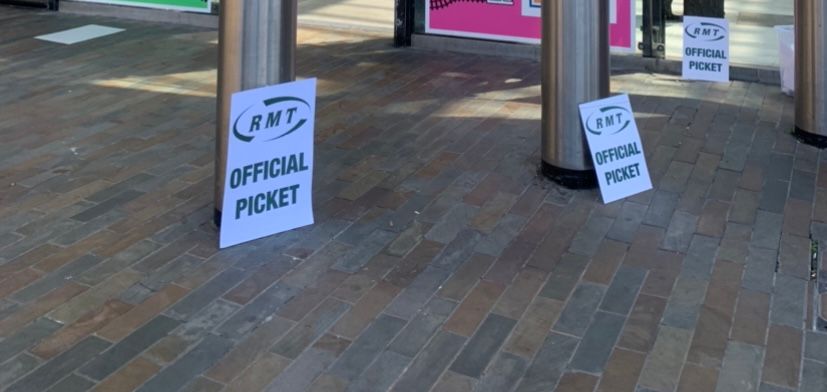Lifting the ban on agency workers during strikes will “endanger public safety” and “poison industrial relations”
The TUC hits out at new Government proposals to use agency workers to fill gaps left by striking workers.

As rail workers across the UK took part in a week of industrial action, the Government unveiled plans to allow employment agencies to supply agency workers to fill staff gaps during industrial action.
The current law prohibits agencies from supplying workers to perform ‘duties normally performed by a worker who is taking part in a strike or other industrial action’. This legislation is to be found in the Employment Agencies Regulations 2004 (SI 2004 No 3319), regulation 7, made under the Employment Agencies Act 1973.
As Professor Keith Ewing mentioned in his analysis last week about the new Government proposal, the ILO Committee of Experts has already concluded that British law does not do enough to protect strikers from being replaced. This is because of the inadequate nature of our unfair dismissal law.
The Government’s proposals will drive a horse and cart through these protections and international conventions. In its wide-ranging jurisprudence on the right to strike, the ILO has for some time taken the view that ‘provisions allowing employers to dismiss strikers or replace them temporarily or for an indeterminate period are a serious impediment to the exercise of the right to strike.’
Unions have met the proposals with an angry response.
TUC General Secretary Frances O’Grady said:
“The government should be getting people around the table to find a fair resolution to this rail dispute.
But ministers are more interested in cynically picking a fight with unions than reaching a negotiated settlement.
Having slammed P&O for replacing experienced workers with agency staff, Grant Shapps is using the same playbook.
These plans are a deliberate attempt to undermine the right to strike and to reduce workers’ bargaining power.
Bringing in less qualified agency staff to deliver important services will endanger public safety, worsen disputes and poison industrial relations.”
Commenting on why the plans are unworkable, Frances O’Grady added:
“Unions and the agency recruitment industry have both warned ministers these plans are unworkable.
Asking agency staff to break strikes will put them in an appalling and impossible situation.
Some may not realise until it is too late that they are being asked to cross picket lines and replace striking workers.
The government is chasing headlines, rather than acting in the national interest.”
The TUC and the Recruitment & Employment Confederation (REC) have issued a joint statement, calling on the Government to abandon its “unworkable” plan to lift the ban on agency workers filling in during strikes.
The full joint statement from the TUC and REC reads:
The Recruitment & Employment Confederation (REC) and Trades Union Congress (TUC) are urging the government to abandon its proposal to repeal the ban on agency workers filling in for employees who are on strike. The two organisations, representing both the agency sector and unions, think the plan is unworkable and oppose it in the strongest possible terms.
They urge the government to leave the current ban in place as a key element of a sustainable national employment relations framework. Using agency staff to cover strikes will only prolong the conflict between employers and their staff. Strikes are industrial disputes within a single industry or firm.
Government needs to step up and do the work around resolving industrial disputes rather than inserting a third party in the form of agency workers into a dispute. That does nothing to solve the underlying issues between the company and their staff. This will only prolong the dispute and inflame tensions. Negotiations should be the obvious priority – rather than potentially putting the safety of agency workers and company employees at risk The proposal is not practical. There are currently 1.3 million vacancies in the UK, a record high. REC data shows that the number of candidates available to fill roles has been falling at record pace for months. In this tight labour market, agency workers are in high demand and can pick and choose the jobs they take.
Agency staff are very unlikely to choose a role that requires them to cross a picket line versus one that doesn’t. Additionally, many roles that may be on strike require technical skills or training. Training agency workers to do these jobs would be expensive and time-consuming. Only recently government ministers came out to condemn what P&O Ferries did. Surely that example cannot have been forgotten so soon? That case showed how unfair these situations can be for agency workers, as well as the negative attention they and the agencies would receive.
Neil Carberry, Chief Executive of the REC, said:
“The government’s proposal will not work. Agency staff have a choice of roles and are highly unlikely to choose to cross picket lines. Agencies want the ban to stay to avoid them being pressured by clients into supplying staff in hostile and potentially dangerous situations. Earlier this year, we saw the effect on agencies who inadvertently got drawn into the P&O dispute. That offers a salutary lesson.
“In all disputes, our aim should be to resolve conflict, not to prolong it. Inserting a different firm’s workers into the middle of a dispute can only ever inflame tensions.
“We urge ministers to re-consider this wrong-headed approach, which runs counter to the standards adopted by the employment industry globally. Business is best served by negotiations, not showdowns.”
Paul Nowak, TUC deputy general secretary, said:
“Just a few months ago Grant Shapps slammed P&O for replacing experienced workers with agency staff. But now he’s proposing to do the same on railways.
“Allowing agency staff to replace striking workers would undermine the right to strike and create genuine safety risks for the public and for the workforce.
“It would put these workers in an appalling situation, worsen disputes and poison industrial relations.
“Having repeatedly promised a high-wage economy, ministers now seem determined to reduce workers’ bargaining power and to make it harder for working people to win fair pay and conditions.
“This government has the power to play an active role in helping to end disputes. But it would rather escalate tensions and pick a fight with unions.”
On international law, Paul Nowak added:
“Once again, this government is showing its disregard for international law, which these proposals almost certainly breach.”







